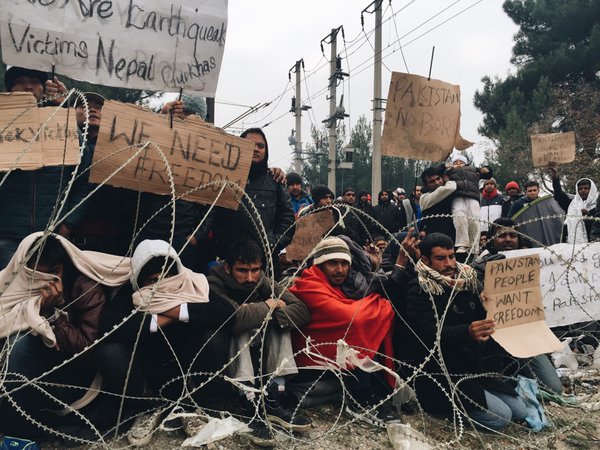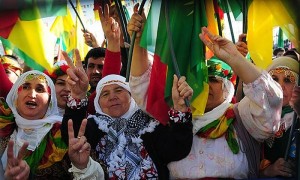
Current situation / Our experiences in Macedonia:
As the Greek/Macedonian border at Idomeni was closed several weeks ago for all refugees that are not from Syria, Afghanistan and Iraq, many refugees from other countries got stuck in Greece. They are now forced to cross the border illegally in the mountains and in the forests and walk through Macedonia for 5-7 days to Serbia by feet and from there continue to Europe.
When we (Open Border Crew) drove through Macedonia in December the last weeks, we met several groups of refugees (especially from Marocco, Pakistan and Iran), that were walking for days along the highway, were beaten up and robbed by the mafia and attacked by the police. If they get caught by the police they are imprisoned and pushed back to Greece. From there most of them are deported back to their home countries, where many are facing violence, poverty and punishment.
We supported them on their way by providing clothes, food, equipment like flashlights and bags, information about the route and documenting their stories. You could also drive them (but be aware of the strict laws concerning refugee support in Macedonia).
We urgently ask for international supporter groups to go to Macedonia and to support refugees crossing Macedonia in any possible way! Show your solidarity practically and let’s tear down Fortress Europe!
Concrete ways of supporting refugees crossing Macedonia
* officially (for refugees from Syria, Iraq, Afghanistan on transit)
You can volunteer at Tabanovce or Gevgelija. The camps are controlled by government and police (Gevgelia at the Greece border is ‘crisis zone’ therefore access is harder, but in Tabanovce at Serbian border you can basically just walk in by showing your passport). Help is quite organized and coordinated by NGOs (get contact from LEGIS over Refugee Volunteer Map below). Those Camps are Transit Camps which means that people are not staying there for a long time but only wait for their next train or bus to arrive. This can take many hours so food and warm clothes are provided in the camps. Both camps can only be accessed by people from Syria, Afghan and Iraq. Illegalized migrants can not get shelter there and we would not recommend them to go there. Help is needed with transporting, sorting and handing out of donations and providing food.
* support illegalized refugees – REALLY IMPORTANT!
What can you do?
– You can drive along the highways and crossing routes (e.g. train tracks, border regions in Greece and Macedonia). Illegalized refugees mostly walk at night (especially early evening after sunset) in the dark and use the highways and the railroads for orientation (e.g. they walk directly on the highway or on smaller streets close to it in the valley or on the railway tracks). People might be resting or waiting for a pick up by traffickers at gas stations or under highway bridges.
You can supply them with flashlights, jackets, scarves, gloves, hats, backpacks, boots / winter shoes, food, water, tea, maps, money, rain clothes and information.
You can build up a mobile soup and tea kitchen going up and down along the highway.
You might find robbed, injured and traumatized migrants. First aid kit is useful (even if its just used for psychological reasons).
Usually people cross from south to north, it makes sense to drive the same direction. Of course people are afraid of police and mafia, so when you approach them make sure they understand you want to help and not harm them. You should walk slowly towards them and not run. You can say “Salam Aleikum” or “Salam” and offer them water, food or other stuff to show you’re not the cops or the mafia.
You can even drive quite slowly and have a close look at the forest beneath or under the roads. When you find people walking in the bushes and it is impossible to reach them (because there might be a big height difference or a river), you can throw some food and / or clothing packages approximately to where they’re walking.
Remember not to frighten them.
Basic Arabic and Farsi skills are helpful, as well as talking French and English. You might take a dictionary for Arabic, Farsi etc. (You can find important words in different languages on the Refugee Phrase Book)
Medical skills are useful as well. If these illegalized people are injured, they can not simply go to a hospital as they will be arrested and deported by the police after their treatment. Of course there can be cases where help in a hospital is urgently needed. You should inform people about the risks they’re facing going to a hospital (prison and deportation) and they should decide themselves what to do. Try not to panic the people and stay calm in communication.
In Macedonia it is – like in many countries – illegal to transport illegalized migrants in your car. Punishment can be deportation or jail up to five years if you get caught by the police. We heard about successful lifts to the border of Serbia. It is up to yourself to get informed and judge the risks. No one is illegal!
– You can build up a network of supporters and activists in Macedonia, Greece and the whole Balkan for supporting refugees on their way to Europe by getting into contact with activists, organizing meetings, building up shelters and emergency phones…contact other activists and the info phone and get in touch with people from “Solidarnost” in Skopje, people from (No Border) Serbia, Bulgaria etc.
– Help establish safe-houses along the route (in Macedonia and the whole Balkan route) and in Skopje. People are starting to build such a support structure. Call the contact phone to get further and recent information on this. The idea is to bring injured or exhausted (illegalized) refugees to private homes or other safe places somewhere, where they can rest and continue after a while. Keep in mind that the place should stay unknown from police and no one should know about it to avoid repression for refugees and supporters by police.
– Publish the EMERGENCY PHONE FOR REFUGEES in Macedonia.
The phone number is: 0030 694 362 02 06
People/Refugees crossing Macedonia can call it if they are in need of support. The phone will be run by volunteers in Macedonia, on the Greek side of the border and by yourself. When called by refugees, support can be given by going there with the car and offering first aid, money, clothing, food and emotional support.
The idea is to already give the number to refugees in Greece who are planning to cross Macedonia (for example at the “Orfanotrofeio” squat in Thessaloniki, in Athens or already on the Greek islands) or when meeting them on the Macedonian roads.
Remember: You can save lives here. Besides state and mafia, the cold is very dangerous, too. In the north of Macedonia, temperature is 10°C less than in the south. In December, it can get up to -15°C by night. People often underestimate this risk and don’t have enough winterproof clothes.
Useful Information for Supporters in Macedonia and Greece:
Facebook group for refugee support in MK: “Help the refugees in Macedonia” (you can also spread information there): http://j.mp/help-mk-refugees
Refugee Volunteer Map with all places along the Balkan Route where support is needed and how the current situation is at different places.
https://www.google.com/maps/d/viewer?mid=zddfRUtGScOc.kQBgTQcoV5FM&hl=en...
(you can also spread information there)
Open Border Blog:
http://openborder.noblogs.org/
Blog from German activists. You can find constantly information about the situation in Macedonia, Bulgaria and the Balkanroute there.
Contact and info phone for international activists and supporters in Macedonia:
Phone number: 00389 719 69 173 (based in Skopje)
You can call the number for any questions concerning legal stuff, sleeping places, contacts,…
There is a place for sleeping in Skopje (a flat could be rented by the group “Solidarnost”) and also the left social center “AKSC” (Address: Orce Nikolov 166, Skopje) where you can go, hang out and sleep during the daytime. There you can connect with political local groups, get support and information about Macedonia and if you need sleeping places etc.
You can also ask for contact to other activists supporting refugees in Macedonia right now. If you are supporting refugees in Macedonia it would be nice if you leave a contact for other activists there.
Contact to international activists that are right now supporting refugees in Macedonia:
Phone number: 0049 157 322 67 952
Email: openborders@riseup.net
You can get information about the current situation and contact to other activists in Macedonia there. If you are supporting refugees in Macedonia it would be nice if you leave a contact for other activists there.
EMERGENCY PHONE FOR REFUGEES crossing Macedonia:
Phone number: 0030 694 36 20 206
People/Refugees crossing Macedonia can call it if they are in need of support. The phone will be run by volunteers in Macedonia, on the Greek side of the border and by yourself. When called by refugees, support can be given by going there with the car and offering first aid, money, clothing, food and emotional support.
The idea is to already give the number to refugees in Greece who are planning to cross Macedonia (for example at the “Orfanotrofeio” squat in Thessaloniki, in Athens or already on the Greek islands) or when meeting them on the Macedonian roads.
SPREAD THIS NUMBER TO REFUGEES!
Contact to the Refugee Squat “Orfanotrofeio” in Thessaloniki:
Phone number for international activists at the squat: 0030 694 299 4063
Phone number of the squat: 0030 698 9389 150
Adress is Grigoriou Lampraki 186 in Thessaloniki, Bus 14/14a at bus station “Orfanotrofeio”.
In the squat there are at the moment around 80 refugees staying together with activists from Greece and international supporters. There you can have a rest, a sleeping place, organize, give information to refugees that want to start to Macedonia and Europe,…
Lets build up a network of solidarity all over Europe!
Thank you for your solidarity with all Refugees!
Lets tear down Fortress Europe and all borders!
No border activists, December 2015
























